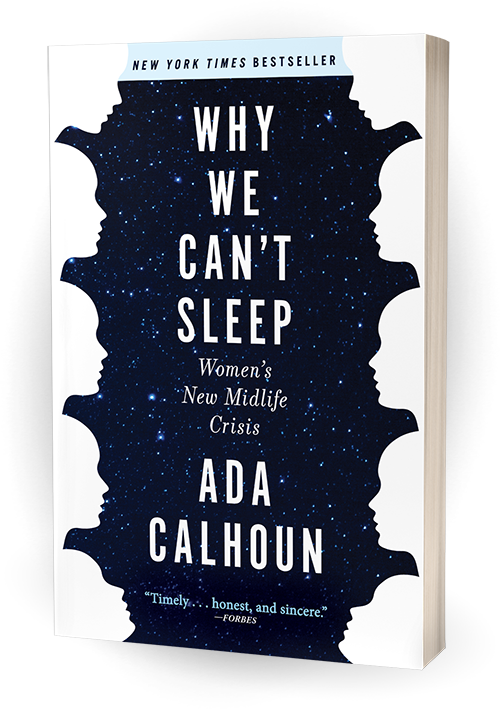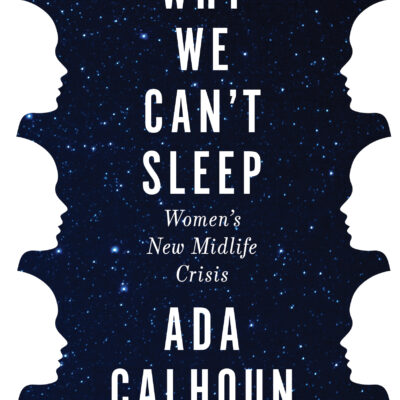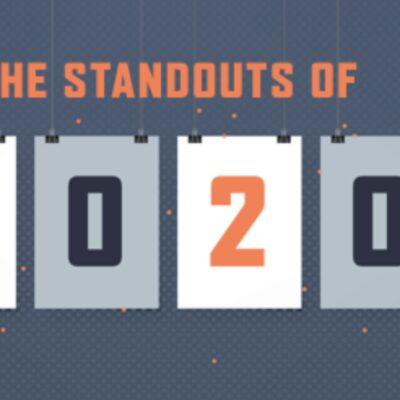One of the Amazon Editors' best nonfiction books of 2020, a Goodreads Choice Award Finalist, and an Indie Next Pick, Why We Can’t Sleep was one of the biggest books of the season according to the New York Times, Parade, O magazine, Book Riot, Vogue.com, RealSimple.com, and Forbes.com.
When Ada Calhoun found herself in the throes of a midlife crisis, she thought that she had no right to complain. She was married with children and a good career. So why did she feel miserable? And why did it seem that other Generation X women were miserable, too?
Calhoun decided to find some answers. She looked into housing costs, HR trends, credit card debt averages, and divorce data. At every turn, she saw a pattern: sandwiched between the Boomers and the Millennials, Gen X women were facing new problems as they entered middle age, problems that were being largely overlooked.
Speaking with women across America about their experiences as the generation raised to “have it all,” Calhoun found that most were exhausted, terrified about money, under-employed, and overwhelmed. Instead of their issues being heard, they were told instead to lean in, take “me-time,” or make a chore chart to get their lives and homes in order.
This generation-defining exploration of the new midlife crisis facing Gen X women and the unique circumstances that have brought them to this point, Why We Can’t Sleep is a lively successor to Passages by Gail Sheehy and The Deadline Decade by Meg Jay.
In Why We Can’t Sleep, Calhoun opens up the cultural and political contexts of Gen X’s predicament and offers solutions for how to pull oneself out of the abyss—and keep the next generation of women from falling in. The result is reassuring, empowering, and essential reading for all middle-aged women, and anyone who hopes to understand them.
“It’s difficult to grapple with the immense anxiety and fear so many women go through alone, but Ada Calhoun’s artistry as a writer makes her the perfect guide through the rough business of middle age.”
—Kathleen Hanna of Bikini Kill
“This is the book of our generation. Ada Calhoun brilliantly encapsulates the struggle and confusion that is the Gen X woman’s experience in middle age. And by placing this condition into the context of the generations coming before and after, she makes sense of how it is that we’re so surprised that we have failed at having it all. Heavily researched, expertly paced, and seamlessly woven together, Why We Can’t Sleep provides an ‘aha’ moment that at once validates our experience and establishes a sense of community and hope.”
—Janet Krone Kennedy, PhD, Clinical Psychologist, author of The Good Sleeper: The Essential Guide to Sleep for Your Baby (and You) and founder of NYC Sleep Doctor
“Ada Calhoun's soulful investigation into the complex landscape women in midlife face today is downright stunning. Calhoun has captured the voices—some broken, some resilient, many barely staying afloat—of over 200 women from around the country and in doing so, shown us how much we share in divisive times. You will recognize yourself in these pages, breathe a sigh of relief, and think, I'm not alone.”
—Susannah Cahalan, author of the New York Times bestselling Brain on Fire
“Helping women realize that some difficulty, some confusion, is not just all in their mind is probably one of your more feminist acts, and the impressive amount of research Ada Calhoun did on the very specific forces, past and present, that are bedeviling Gen X women as they face the strange period that is midlife is just that kind of gift. But the other gift is that she writes with clear sight, compassion, and hope about our very specific talents and tenacity. Which means: this book is a thousand times more healing than a jadeite egg!”
—Carlene Bauer, author of Not That Kind of Girl and Frances and Bernard
“'Having it all' was the Baby Boomers’ rallying cry as, aided by new tools of reproductive control, we burst from the pink ghettoes of the secretarial pool and ceaseless childcare to seek fulfillment in workaholic professions. We sought to join career ascendance to the twin chimeras of egalitarian marriage and joint child-rearing but by the classic midlife reckoning, most boomer women reaped frustration. Two generations later, despairing Gen X women find the glass mountain of fulfillment still impossible to scale, and with deep perception, wit and incisive analysis, Ada Calhoun tells us why. In tracing the internal as well as the external forces that separate women from the peace they’ve spent their lives earning, Calhoun unveils the cleavage between our ideals of meritocracy and a reality haunted by employment bias, housing costs, divorce rates and a profound inattention to the real challenges facing the distaff side."
—Harriet A. Washington, Medical Apartheid and A Terrible Thing to Waste: Environmental Racism and Its Assault on the American Mind
"An assured, affable guide, Calhoun balances bleakness with humor and the hope inherent in sharing stories that will make other women feel less alone. She also gives good advice for finding support through midlife hardship. This is a conversation starter (as well as a no-brainer for book groups that count Gen X women among their members) that might get Boomer and Millennial readers curious, too."
—Booklist
One of the "Most Anticipated Books of 2020"!
“I love Ada Calhoun’s writing. Why We Can’t Sleep just took me to school, laughing all the way there.”
—Adam Horovitz of Beastie Boys
One of the "22 Best Books to Read in Winter 2019"!
"Ada Calhoun provides a thoughtful, incisive account of the myriad challenges facing Generation X women."
"Bracing, empowering... Women of every generation will find much to relate to in this humorous yet pragmatic account."
"Timely, humane, raw, honest, and sincere. This is my kind of book, one that will land front and center of our Intentionalist (a word we made up to identify with those attempting to live more intentionally in all ways) section. We have a philosophical saying around Commonplace: We don’t read to escape life; we read to more fully and deeply engage it. This is that book. A personally universal guide.”
*STARRED REVIEW* "Calhoun’s latest will be useful for those interested in feminist theory, especially insofar as it intersects with age and class, as well as a useful resource for people struggling to find balance in their personal and professional lives."
"January Book Releases You'll Want to Pre-Order Now"
"30 of the Best and Most Anticipated Books of 2020 (So Far)"
"7 Timely Books to Add to Your TBR List"
"10 Books to Watch For in January"
"Best New Books to Read in January 2020"
"The book makes a powerful argument...Calhoun speaks directly to her own generation...I found reading “Why We Can’t Sleep” to be a singular experience — driving home her point that Gen X is so often overlooked."
"A funny, smart, compassionate narrator….taking women’s concerns seriously...Highly persuasive."
"I am an Xer, 42 years old, and I felt indicted by so much of Calhoun’s book, an engaging hybrid of first-person confession, reportage, pop culture analysis, and statistics. I nodded along as she wrote of the impossibility of balancing parenthood with professional ambition; I shuddered as she lamented her financial instability and lack of a plan for retirement. I recognized the feeling of vague discontent that she diagnosed as the remit of middle age. Reading Why We Can’t Sleep I worried I was pre-menopausal; testament, I think, to Calhoun’s powers of persuasion, since I’m a man."
"A superb mix of personal stories and deep research about a generation of women who are facing unprecedented pressure as they enter middle age. It’s at once realistic, but positive, asking women to face up to reality, let go of expectations, find a support system and accept this stage isn’t forever."
"Marriage implosions, rising debt, and a constant sense of failure pop up throughout this brief but potent and sometimes funny book... It might be easy to make fun of such responses—many people in the country, let alone the world, don’t have an iProduct of any kind to smash, let alone a job to shirk, but Calhoun is quick to acknowledge how for the women she interviews that awareness adds yet more shame to their feeling. Why can’t they get it together, why can’t they just be grateful? Pain and being overwhelmed, Calhoun concludes, at least for the women she interviews, is not an enlarging experience but an isolating one. On that level, Why We Can’t Sleep might do much to let readers like the women Calhoun writes about that they are not alone."
“Women are taught to not feel anything for ourselves and to not feel for one another. And our generation is the smallest generation. We are sandwiched in between the millennials and the boomers. And we are much smaller -- if you will, the middle child. The Jan Brady generation. [Why We Can’t Sleep] is a book that makes you feel less crazy. Like oh, it is not my imagination.”
















